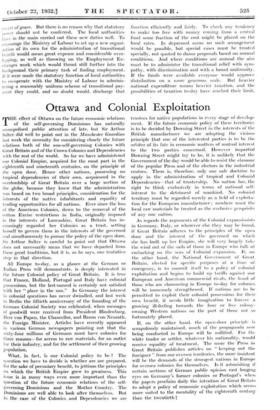Ottawa and Colonial Exploitation
THE effect of Ottawa on the future economic relations of the self-governing Dominions has. naturally monopolised public attention of late, but Sir Arthur Salter did_ well to point out in the Manchester Guardian last week the necessity for considering closely the future relations both of the non-self-governing Colonies with Great Britain and of the Crown Colonies and Dependencies with the rest of the world. So far we have administered our Colonial Empire, acquired for the most part in the eighteenth and nineteenth centuries, on the principle of the open door. Hence other nations, possessing no tropical dependencies of their own, acquiesced in the overlordship of Great Britain over a large section of the globe, because they knew that the administration was based on two broad principles, consideration for the interests of the native inhabitants and equality of trading opportunities for all nations. Ever since the loss of the American Colonies, down to the removal of the cotton Excise restrictions in India, originally imposed in the interests of Lancashire, Great Britain has in- creasingly regarded her Colonies as a trust, setting herself to govern them in the interests of the governed and simultaneously to pursue the policy of the open door. Sir Arthur Salter is careful to point out that Ottawa does not necessarily mean that we have departed from these great traditions, but it is, as he says, one tentative step in that direction.
All Europe . to-day, as a glance at the German or Italian Press will demonstrate, is deeply interested in the future Colonial policy of Great Britain. It is true that France, Holland, Portugal and Italy have colonial possessions, but the last:named is certainly not satisfied with her "place in the sun." In Germany the interest in colonial questions has never dwindled, and last week in Berlin the fiftieth anniversary of the founding of the German Colonial Society was celebrated, when messages of goodwill were received from President Hindenburg, Herr von Papen, the Chancellor, and Baron von Neurath, the Foreign Minister, Articles have recently appeared in various German newspapers pointing out that the sixty-four millions of Germans must have colonies for three reasons—for access to raw materials, for an outlet for their industry, and for the settlement of their growing population.
What, in fact, is our Colonial policy to be ? The question we have to decide is whether are are prepared, for the sake of pecuniary benefit, to jettison the principles on which the British Empire grew to greatness. This issue is in many ways even more important than the question of the future economic relations of the self- governing Dominions and the Mother Country. The Dominions are well able to look after themselves. But in .the- case of the Colonies and Dependencies we are trustees for native populations in every stage of develop- ment. If the future economic policy of these territories. is to be decided by Downing Street in the interests of the British manufacturer we are adopting the vicious principle that one of the interested parties is to be the arbiter of its fate in economic matters of mutual interest to the two parties concerned. However impartial Downing Street. might try to he, it is unlikely that the Government of the day would be able to resist the clamour of the popular Press and of the electors in the industrial centres. There is, therefore, only one safe doctrine to apply in the administration of tropical and Colonial Dependencies---that of trusteeship. No nation has the right to think exclusively in terms of national self- interest to the detriment of mankind. No colonial territory must be regarded merely as a field of exploita- tion for the European manufacturer ; nowhere must the local raw 'materials be treated as the exclusive perquisite of any one nation.
As regards the arguments of the Colonial expansionists in Germany, Italy, or wherever else they may be found, if Great Britain adheres to the principles of the open door and- the interest of the governed on which she has built up her Empire, she will very largely take the wind Out of the sails of those in Europe who talk of embarking on the seas of Colonial expansion. If, on the other hand, the National Government of Great. Britain, elected for specific purposes at a time of emergency, is to commit itself to a policy of colonial exploitation and begins to build up tariffs against our European and American commercial rivals, the hand of those who are clamouring in Europe to-day for colonies. will be immensely strengthened. If nations are to be permitted to exploit their colonial possessions for their own benefit, it needs little imagination to foresee a growing ill-feeling towards. the four or five colony- owning Western nations on the part of those not. so fortunately placed. - If, on the other hand, the open-door principle is scrupulously maintained, much of the propaganda now being conducted in Europe will be nullified. For the white trader or settler, whatever his nationality, would receive equality of treatment. The more the Press in Great Britain publishes articles on " keeping out the foreigner ". from our oversea territories, the more insistent will be the demands of the strongest nations in Europe for oversea colonies for themselves.. Is it astonishing if certain sections of German public opinion cast -longing eyes on Germany's former colonies or Portugal's when the papers proclaim daily the intention of Great Britain to adopt :a policy of economic exploitation which seems more suited to the mentality of the eighteenth century than the twentieth?














































 Previous page
Previous page